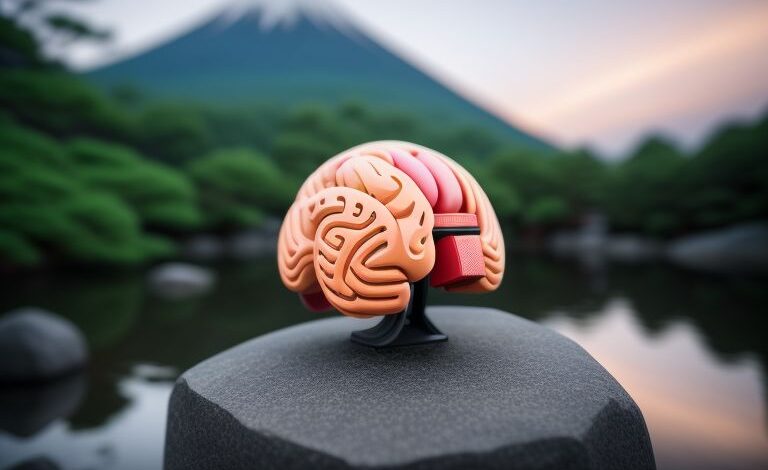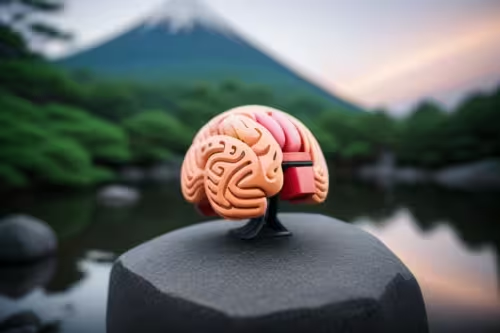Unlock Your Mind: The Proven Japanese Techniques for Ultimate Brain Optimization

In today’s fast-paced world, the pressure to keep up mentally is at an all-time high. Whether it’s work deadlines, personal commitments, or the incessant information overload, optimizing our brain function has become more than just a desire—it’s a necessity. But what if there was an ancient, culturally grounded way to enhance your brain's cognitive abilities, focus, and overall mental clarity? Enter Shinrin-yoku, also known as “forest bathing,” a powerful Japanese technique for brain optimization.
This post dives deep into the core of this Japanese tradition, supported by scientific research, and provides practical tips to harness its brain-boosting effects. We’ll also explore the broader applications of brain optimization using Japanese techniques, bridging cultural practices with modern neuroscience.

The Growing Need for Brain Optimization
In today’s digital age, distractions are rampant. Our brains are constantly overstimulated, leaving us prone to fatigue, anxiety, and even burnout. With technology advancing faster than our cognitive evolution, it's no surprise that many seek ways to boost brain performance naturally.
While brain optimization might seem like a modern buzzword, it's a practice deeply rooted in centuries-old traditions, particularly in Japan. The country is renowned for its long-standing emphasis on mindfulness, wellness, and harmony with nature. The Japanese have cultivated techniques that aren't just about sharpening the mind but also nurturing its health holistically.
What is Brain Optimization?
Brain optimization refers to techniques, habits, and interventions that enhance cognitive function, emotional well-being, and mental clarity. From memory enhancement to improved concentration, brain optimization seeks to help individuals perform at their cognitive peak.
While Western culture often emphasizes quick fixes like nootropics and caffeine, Japanese traditions prioritize long-term brain health, with practices that incorporate mindfulness, nature immersion, and intentional living.
One of the most effective Japanese techniques for brain optimization is Shinrin-yoku, or forest bathing, which merges nature with mindfulness to boost mental well-being and cognitive function.
Shinrin-Yoku: The Japanese Secret to Brain Optimization
Shinrin-yoku translates to “forest bathing,” but it doesn't involve water. Instead, it refers to immersing oneself in a natural, forested environment to soak in the sights, sounds, and smells, essentially “bathing” the brain and body in nature's benefits. This practice, which originated in Japan during the 1980s, has become a key component of the country’s public health system.
But how does forest bathing contribute to brain optimization? Let's explore the cognitive benefits:
1. Reduced Mental Fatigue and Stress
Scientific research has shown that exposure to natural environments, especially forests, significantly lowers cortisol levels (the stress hormone). When stress is reduced, cognitive functions like problem-solving, memory recall, and focus improve. Forest bathing calms the mind, allowing it to recharge, which is essential for cognitive optimization.
2. Enhanced Focus and Memory
A study published in the journal Environmental Health and Preventive Medicine revealed that participants who spent time in forests showed a 20% improvement in memory recall compared to those in urban settings. The quiet and tranquility of nature provide the brain with a break from overstimulation, allowing it to regain focus and enhance its ability to retain information.
3. Boosted Creativity
Time in nature, especially through practices like Shinrin-yoku, has been shown to enhance creative problem-solving skills. Nature provides an ideal setting for the brain to wander freely, promoting what neuroscientists call “soft fascination,” which leads to creative breakthroughs.
4. Improved Cognitive Flexibility
Cognitive flexibility is the brain's ability to switch between thinking about two different concepts or to think about multiple concepts simultaneously. Nature immersion has been linked to improved cognitive flexibility, helping individuals adapt better to changes, think more fluidly, and improve their problem-solving abilities.
5. Increased Brainwave Activity
Recent studies have shown that forest environments can boost alpha brainwave activity, which is linked to relaxation and creative thinking. Alpha waves help with stress reduction and calm the nervous system, allowing for a clearer, more focused mind.
How Does Shinrin-yoku Compare to Other Brain Optimization Techniques?
While there are numerous methods to optimize the brain, Shinrin-yoku offers unique benefits that set it apart from other techniques such as meditation, dietary changes, or nootropic supplements:
- Mindfulness with Minimal Effort: Unlike meditation, which requires focused attention, forest bathing encourages passive mindfulness. Simply walking in the forest allows your mind to enter a relaxed state, without the need for active concentration.
- Holistic Wellness: While brain supplements or nootropics might improve cognition temporarily, Shinrin-yoku offers a more holistic approach by improving both mental and physical health. Studies have shown that time spent in nature can lower blood pressure, improve immune function, and reduce symptoms of depression and anxiety, alongside cognitive benefits.
- Connection with Nature: As technology continues to dominate our lives, many people suffer from “nature deficit disorder.” Forest bathing counters this by reconnecting individuals with the natural world, an essential aspect of emotional and mental well-being.
Scientific Backing for Brain Optimization through Nature
A landmark study from Japan’s Chiba University found that subjects who walked through forests experienced a reduction in cortisol levels, decreased heart rates, and lower blood pressure compared to those who walked in urban areas. Another research piece published in Nature highlighted that nature immersion could improve cognitive function by 20%, reinforcing Shinrin-yoku as a scientifically supported brain optimization technique.
Moreover, researchers at Stanford University demonstrated that walking in nature reduces the neural activity in the subgenual prefrontal cortex, the part of the brain associated with rumination—a repetitive negative thought pattern that often leads to anxiety and depression.
Implementing Shinrin-yoku for Brain Optimization in Your Daily Life
While the concept of Shinrin-yoku may sound ideal for those who live near lush forests, you don’t need to be in Japan or even near a forest to benefit from this practice. Here are some ways to incorporate forest bathing into your life, even in urban settings:
1. Seek Out Nearby Green Spaces
Even if you live in a city, local parks or botanical gardens can provide a slice of nature. Visit these places regularly to engage in your own form of forest bathing. Make it a habit to walk in these green spaces without any distractions (leave your phone behind) to let your brain soak in the environment.
2. Bring Nature Indoors
If regular outdoor trips aren’t feasible, surround yourself with plants at home or in your workspace. Incorporating natural elements, such as houseplants, wood materials, and nature-inspired artwork, can replicate some of the calming effects of a forest environment.
3. Practice Mindful Walking
Whether you're in a forest, park, or even a quiet street, practice mindful walking by paying attention to the sounds, smells, and sights around you. Notice the texture of leaves, the scent of flowers, and the rustling of the wind. This simple shift in awareness can bring many of the same benefits as forest bathing.
4. Regular Weekend Nature Trips
Try to schedule weekly or monthly trips to more natural settings, like hiking trails, beaches, or mountain ranges. Dedicate time to disconnect from the digital world and immerse yourself fully in nature.
Complementing Brain Optimization Techniques
In addition to Shinrin-yoku, here are a few more Japanese-inspired techniques to optimize your brain:
1. Ikigai (Finding Purpose)
The Japanese concept of Ikigai, or “reason for being,” is linked to greater mental clarity and focus. By aligning your daily activities with a greater sense of purpose, you can maintain a sharp and driven mindset.
2. Kaizen (Continuous Improvement)
Practicing Kaizen, which refers to small, incremental improvements, helps the brain stay engaged and challenged over time. Constant learning and self-improvement ensure that the brain remains plastic and adaptable, preventing cognitive decline.
3. Meditation and Zazen
While forest bathing focuses on external environments, Zazen (seated meditation) offers an internal form of mindfulness that can further optimize brain function by promoting emotional balance and enhancing concentration.
Final Thoughts: The Future of Brain Optimization Through Japanese Techniques
As we move deeper into the 21st century, the need for brain optimization will only grow. While supplements and technological solutions may offer temporary relief, Shinrin-yoku and other Japanese techniques provide a sustainable, holistic way to boost brain function naturally.
The science behind forest bathing and its effects on mental clarity, focus, and overall cognitive health is undeniable. By embracing this ancient practice and coupling it with modern lifestyle adjustments, you can unlock the true potential of your brain.
Ready to Reboot Your Brain?
Take the first step toward optimizing your brain by finding your nearest green space and incorporating Shinrin-yoku into your routine. With consistent practice, you'll notice a profound improvement in your mental clarity, creativity, and focus—naturally, and without the need for artificial stimulants.



